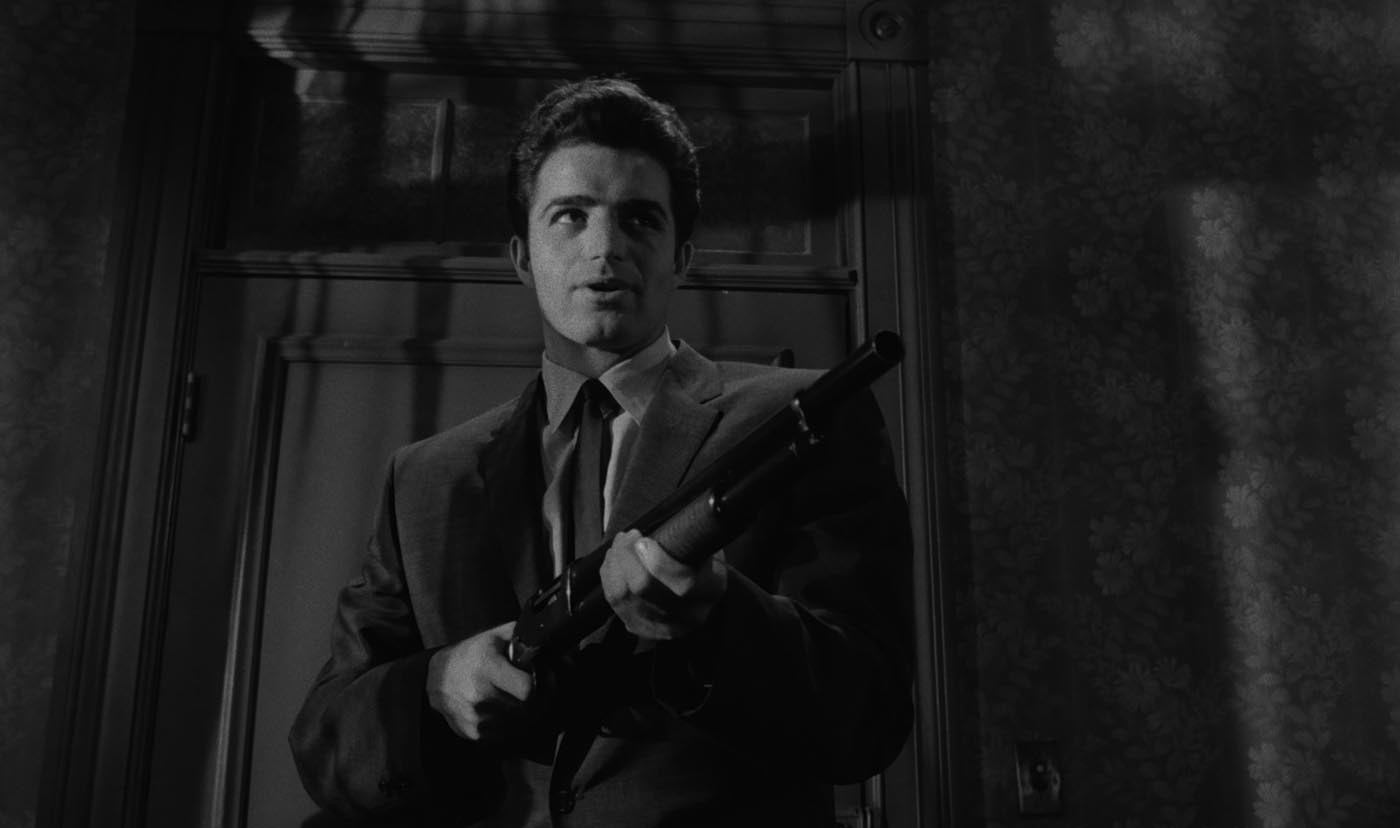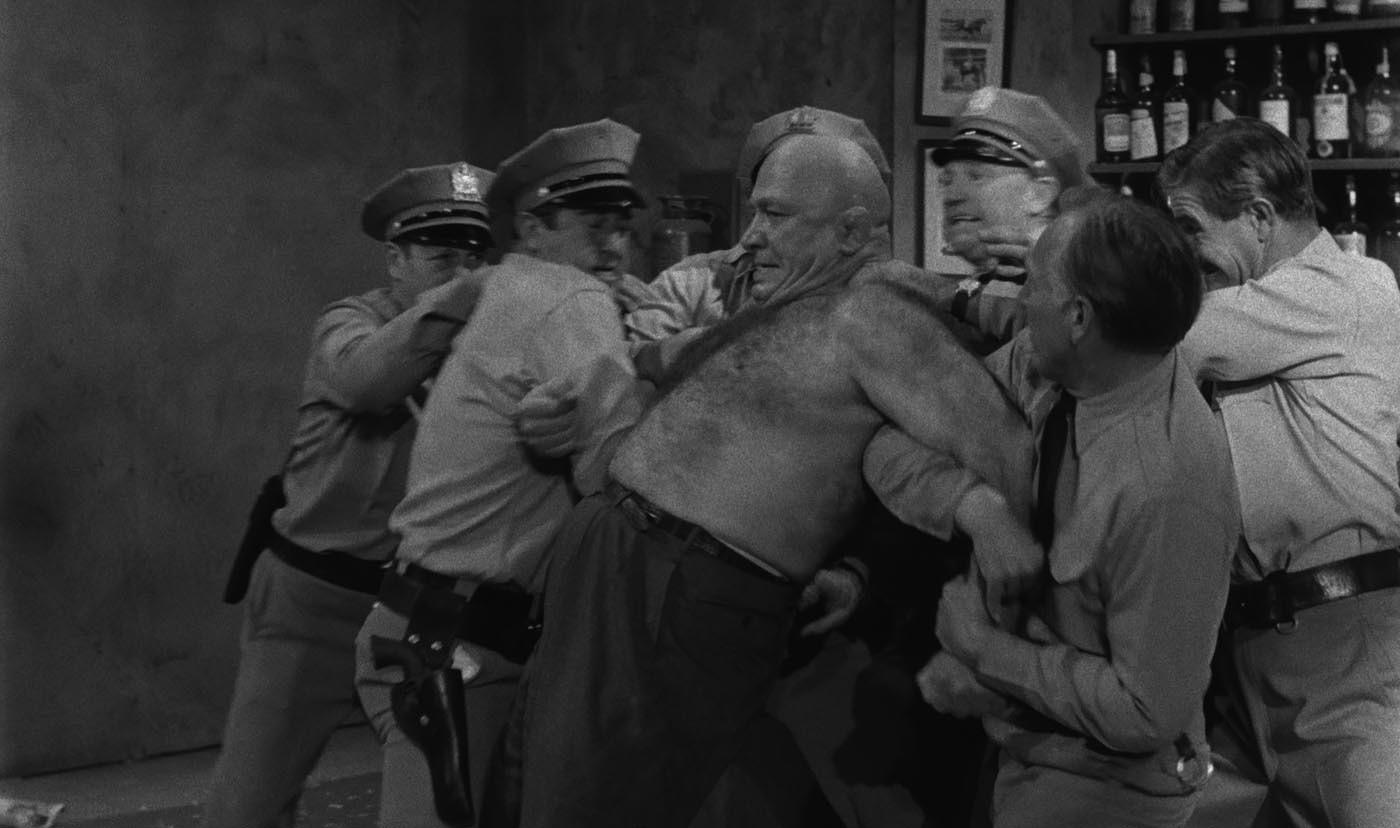Summary:
Mobsters plan to rob a racetrack.
My Thoughts:
I knew next to nothing about this film when I went into it, and sometimes, that’s the best way to experience a movie for the first time. Kubrick is a director that understands how to bring forth a sardonic sense of irony in many of his movies, and this one is a perfect example of his wit. “The Killing” is Kubrick’s third film, and it’s also the film where he really starts to find his footing as a director. The dialogue is snappily written, the characters are all despicable but interesting people, and the story itself is shockingly violent and filled with double crosses and back stabbings. This is a perfect example of a gritty noir film from the 50s, and it’s also a great place for Kubrick to really start showcasing his brilliance.
“You’ve got a great big dollar sign there where most women have a heart.”
Johnny Clay (Sterling Hayden, “Dr. Strangelove or How I Learned to Stop Worrying and Love the Bomb”) organizes the burglary of a racetrack, knowing the payout will be over two million dollars. He has a few accomplices, all of whom have need for the money. However, unbeknownst to Clay and his associates, one of them, George Peatty (Elisha Cook, Jr, “Rosemary’s Baby”) tells his wife Sherry (Marie Windsor, “Swamp Woman”) about the robbery. Sherry is having an affair with the villainous Val Cannon (Vince Edwards, “Murder by Contract”), and Val, too is aware of the planned robbery and is hatching a plan of his own.
So first off, this is a great noir piece (and that’s coming from a man that could usually take or leave noir films). It has all the elements that you could want; brash and violent characters, femme fatales, gunfights, betrayals, and so much excitement. Almost all of the tension in this film comes from the audience knowing things that other characters don’t know, getting insights into planned betrayals before they take place, and knowing how the robbery is planned to play out but then watching the plan slowly start to unravel. Even from the start of the film, the character relationships are murky and the characters themselves seem selfish and greedy. You can never really tell what the intentions of anyone are until after they’ve already done what it is they intended to do, as a result, many of the twists and turns come suddenly and are very shocking. I think what I found most impressive in this film was the way that the climax was handled- we watch each person execute their part of the plan in entirety, instead of cutting between all of the different storylines. As a result, the last thirty to forty minutes of this movie were incredibly taut and tense. The way that this was handled reminded me a lot of how the timeline in “Dunkirk” played out. Nolan has clearly taken inspiration from Kubrick in a number of his films, and this one is an inspiration for a few of Nolan’s movies. Take a look at the clown mask that Johnny wears near the climax of the film and see if you recognize the mask (“The Dark Knight” opening heist scene, anyone?). The other thing I really like about this film is the incredible amount of irony that comes with the ending. I don’t want to spoil the ending at all, so I’ll refrain from giving away any details; but the way this film ends is wonderfully dark and undeniably satisfying.
There are a few slower scenes at the beginning of the film, but it’s all a setup for what’s to come- but I suppose that would be my biggest complaint for the film. I do have to say, however, that the execution is what makes this story great. The way the film unfolds, giving us multiple climaxes within a short period, really helps sell the movie. The irony of the ending also helps elevate the film above run-of-the-mill noir thrillers, but the actual story feels very similar to other heist films that we’ve seen before. I guess with Kubrick one always expects something phenomenal, and while I really enjoyed the heck out of this movie, I wouldn’t say it’s as inventive of Kubrick’s films. This is the first of Kubrick’s films that was really considered good; it’s the one that put him on the map, and it’s what really started his rise to the top of his form. Kubrick established himself as a director in the 50s, refined his talents in the early 60s, and by the late 60s he was at the top of his game, and that lasted for the remainder of his career (except maybe “Eyes Wide Shut”). While this is certainly a very good movie, I would probably rank this near the bottom of my favorite Kubrick films, and that’s truly a testament to the director. If this movie had come from any other mainstream director in the 50s, I could see this being my favorite of their films, but it came from Kubrick, the genius that gave us “A Clockwork Orange”, “2001: A Space Odyssey”, “Dr. Strangelove”, “Full Metal Jacket”, “The Shining”, “Spartacus”, “Barry Lyndon”, and “Lolita”. “The Killing”, in my opinion, is a lesser film than all of the ones I just mentioned, but it’s still a really good movie.
Verdict:
This is a film where, once again, my personal tastes have probably influenced my opinion on the film. This movie is very well done, and it’s certainly one of the more entertaining noir films I’ve seen from the 50s, but when compared to the rest of Kubrick’s oeuvre it just doesn’t quite do as much for me (though for you, it might- I’ve always been iffy about noir films). I’d still recommend this film to most people, particularly those that have an interest in classic Hollywood, noir, or Kubrick as a director.
Review Written By:







